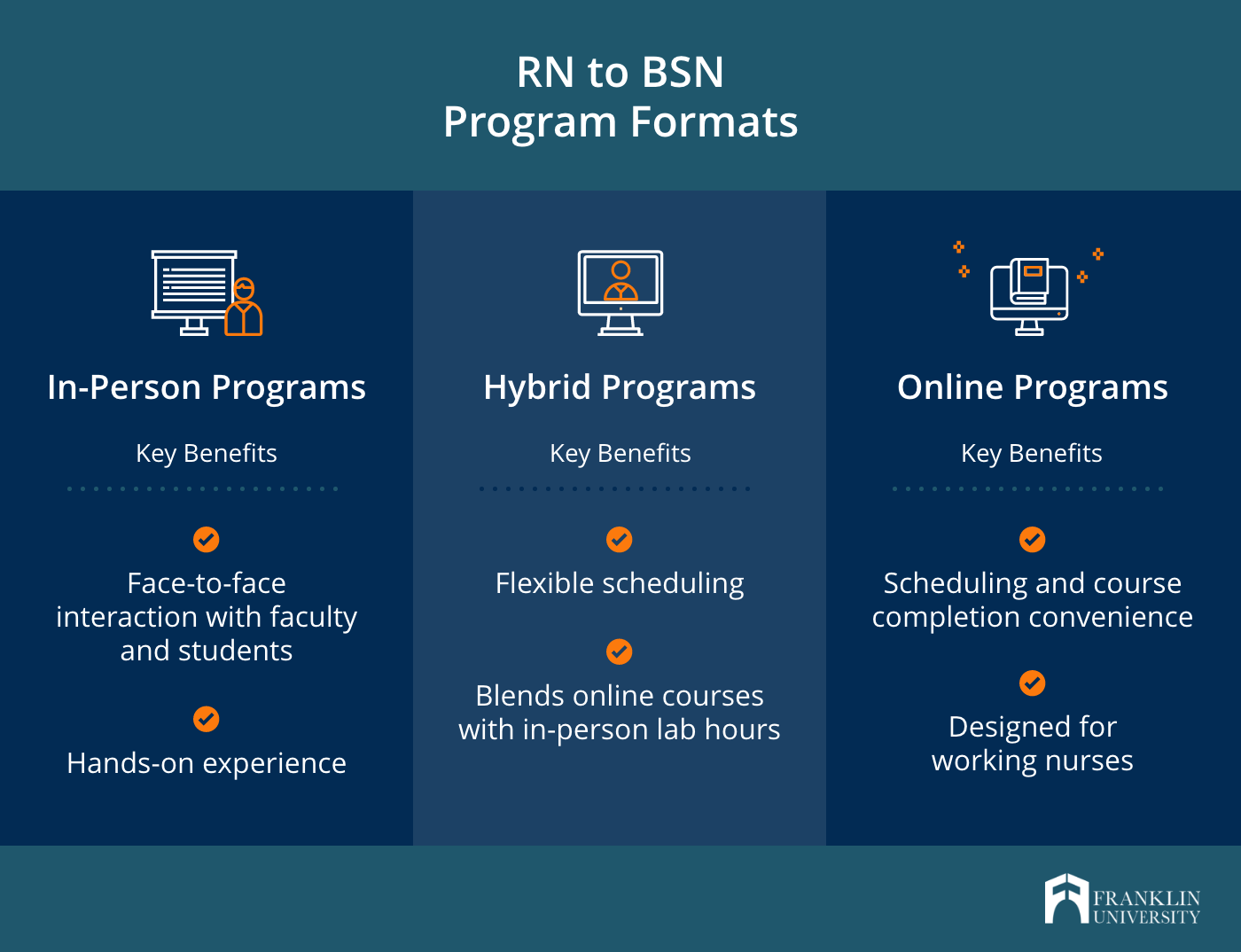Request Information
We're Sorry
There was an unexpected error with the form (your web browser was unable to retrieve some required data from our servers). This kind of error may occur if you have temporarily lost your internet connection. If you're able to verify that your internet connection is stable and the error persists, the Franklin University Help Desk is available to assist you at helpdesk@franklin.edu, 614.947.6682 (local), or 1.866.435.7006 (toll free).
Just a moment while we process your submission.

How Long Are RN to BSN Programs?
The number of registered nurses who earned Bachelor of Science in Nursing (BSN) degrees increased 170% between 2010 and 2017 according to the American Association of Colleges of Nursing (AACN). The jump came after the Institute of Medicine recommended that at least 80% of working nurses have baccalaureate credentials by 2020. In response, many hospitals and medical centers have increased their entry-level requirements for nurses from registered nurse (RN) to BSN.
%20%E2%80%93%20Revised_2.png)
In addition to being more employable, nurses who hold BSNs earn higher salaries than their RN counterparts. According to Lightcast, a global leader in labor market analytics, the median advertised salary in job postings requiring a BSN in the past year was $80,300. That’s about $2,700 more than the median advertised salary for job postings requiring just an RN license.
Given that information, a BSN is an investment worth considering for current RNs. But how long does it take to earn an RN to BSN degree? This article will help you answer that question.
Get a FREE guide to help you advance your career, featuring helpful advice and thoughtful insights from nursing experts.
What Kinds of RN to BSN Programs Are Available?
First and foremost, how long does it typically take to complete an RN to BSN program?
An RN to BSN program, if undertaken full time, takes around one year to complete, according to Dr. Melanie Brewer, RN, FNP-BC, NEA-BC, FAANP, chair of Franklin University’s RN-BSN program. RN to BSN programs are typically offered in three formats:

In-person RN-BSN Programs
In these programs, you take courses on the degree-granting university’s campus or an affiliate institution’s campus. This is best for people who can take time off from work to complete the program. The benefits include face-to-face interactions with faculty and fellow students and hands-on experiences. The disadvantages are that in-person programs are generally inflexible in terms of how fast you can take courses, as well as where and when you can take them.
Hybrid RN-BSN Programs
These programs typically blend online coursework with in-person lab or simulation hours, and occasional meetings. A hybrid program is usually a better fit than an in-person program for nurses with busy schedules. These programs are more flexible in scheduling, meaning you have some choice about where and when you meet your requirements.
Online RN-BSN Programs
Most online RN to BSN programs (like Franklin’s) offer all degree requirements remotely. Many online programs also offer their courses asynchronously—meaning you can complete all of your requirements when it’s most convenient for you. Online programs are a good fit for nurses who need maximum flexibility in completing their program.
What Factors Can Impact Your RN to BSN Completion Time?
There are several factors that can impact the speed with which you complete your BSN degree. Most are within your control, and with advance planning, you can complete your RN to BSN degree as quickly as you wish.
Enrollment Status (part time vs. full time)
If you take a full-time course load in each term you’re enrolled in an RN to BSN program (this varies program to program), you will complete your degree faster than if you take courses part time. At some institutions, it’s even possible to take an overload of courses if your schedule permits you to do so, further shortening your time to completion.
“How fast a student completes a program largely depends on individual motivation,” Dr. Brewer says. “In the hospital setting, it’s difficult to get hired unless you have a BSN, and that’s a big motivator to get people to proceed quickly. At the same time, a lot of RN to BSN students are working and/or providing care for family members, and having some flexibility for work-life balance is important. Moving along at a part-time pace may be more appealing to them.”
Program Structure
Course availability can be an obstacle to finishing a degree as quickly as you’d like to. At most institutions, there are a series of courses that must be taken in sequence—but not all courses are offered each term. If one course you need isn’t offered at the precise time you need it, that can delay your progress. That’s why it’s important to speak with an adviser as early as possible after enrolling in your program to ensure you give yourself the best chance to proceed at the pace you want.
According to Dr. Brewer, when students are admitted to Franklin’s RN to BSN program, each is assigned an academic adviser to guide them. They can also work directly with the BSN program chair to explore opportunities to expedite their progress.
Financial Constraints
Affording an RN to BSN program is an important, but significant, financial investment. For some students, this can slow their progression through a program. However, many institutions have programs and initiatives that can help. At Franklin, those include:
- The $3,000 Smart Start scholarship, which is awarded to incoming RN-to-BSN students
- Tuition benefits through employers
- Partnership discounts
- Online, asynchronous courses that enable RNs to maintain full-time work
- No clinical fees
- $0 for nursing textbooks
Transferability
The number of credits you can transfer from your associate degree or diploma program can accelerate your RN to BSN path. On average, RNs with an Associate Degree in Nursing transfer 74 credits toward the BSN at Franklin, which is 60% of the required credits. If a new RN to BSN student transferring 74 credits chooses to attend Franklin full-time, they can amass the remaining credits they need within one year.
Required Practicums, Clinicals or Labs
Some RN to BSN programs will accept work experience as a substitute for clinicals, practicums, or simulation labs. Others offer online versions of these opportunities. Still others have none of these requirements. However, some programs do require in-person clinicals, practicums or labs, and some online programs do not offer courses asynchronously. If your schedule does not permit you to attend these required events as scheduled, it can delay your program. This is another area where speaking with an admissions adviser can help you clearly understand what is required to graduate from a specific program and make a plan to meet those requirements.
Admission Schedules
Some institutions enroll new students once, twice or three times per year. Others offer enrollment on a rolling basis throughout the year. At Franklin, for example, courses are offered in trimesters and start dates vary within each term. Admissions advisers will be able to provide you an accurate picture of when you can start your program and what implications that will have for how fast you can earn your degree.
How Long Does It Take to Get an RN to BSN at Franklin?
Even for motivated nurses, entering an RN to BSN program can be intimidating. Although an RN to BSN program is a big commitment, most institutions offer a variety of resources that can make your degree affordable, manageable and attainable.
Franklin is one of those institutions. The Franklin RN to BSN program was designed for RNs, by RNs, and students can complete their requirements within one year. Through generous transfer allowances and largely asynchronous course delivery, students can proceed through their requirements as quickly—or as slowly—as they wish. But what really separates the Franklin program, says Dr. Brewer, is the high level of support students receive from day one.
“The support at Franklin is excellent and above what I’ve seen in many other institutions’ RN to BSN programs,” Dr. Brewer says. “We have one academic adviser assigned to each student, to work with them as soon as they enroll to plan the sequence of their classes. And students can work with faculty, the program chair, and their course instructors to arrange the additional support they need to make it to graduation when they want to.”
To learn more about Franklin’s RN to BSN requirements, curriculum, and support services, please visit the program page.





